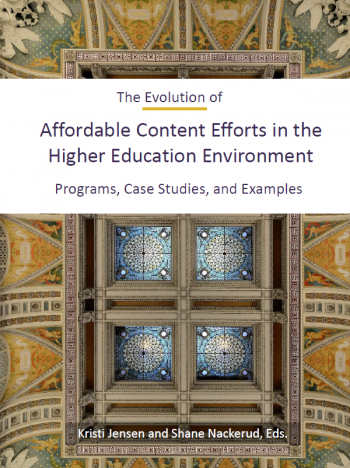Adopting OER means including OER materials in your course without making significant revisions to the materials. These materials may include textbooks, chapters, eBooks, worksheets, videos, modules, slides, and more. This is a great way to get started with OER as you can use as little or as much of a resource as needed.
You can use our Finding OER page to find OER for your course.
OpenNJ is a repository of OER materials created by New Jersey universities and colleges. It hosts full courses, textbooks, slides, lectures, modules, activities, labs, lesson plans, assessments, exams, and more. Managed by Middlesex College, OpenNJ is a great place to get started with adopting OER.
 The OER Starter Kit by
The OER Starter Kit by  Faculty OER Toolkit by
Faculty OER Toolkit by  The Evolution of Affordable Content Efforts in the Higher Education Environment by
The Evolution of Affordable Content Efforts in the Higher Education Environment by Adapting (or revising, modifying, altering, customizing) OER involves making changes to existing OER materials to make the materials more relevant to your course. You might adapt an OER to add additional information, update with current events, adjust the teaching style, address the needs of your students, translate materials into another language, and more.
 When adapting OER, it is important to understand the resource's license. This will influence exactly how the resource can be used, revised, and shared. Often, open resources will use Creative Commons Licenses. FDU Libraries has also created a Guide to Creative Commons, which is located within our Open Access Guide.
When adapting OER, it is important to understand the resource's license. This will influence exactly how the resource can be used, revised, and shared. Often, open resources will use Creative Commons Licenses. FDU Libraries has also created a Guide to Creative Commons, which is located within our Open Access Guide.
 Adaptation Guide by
Adaptation Guide by  Modifying an Open Textbook: What You Need to Know by
Modifying an Open Textbook: What You Need to Know by To create OER means to author a new resource using an open license. You may choose to create a course, textbook, module, worksheet, and more. While this may seem like a large undertaking, there are many resources and guides that can help guide you in creating your open resource.
 Authoring Open Textbooks by
Authoring Open Textbooks by  The Rebus Guide to Publishing Open Textbooks (So Far) by
The Rebus Guide to Publishing Open Textbooks (So Far) by